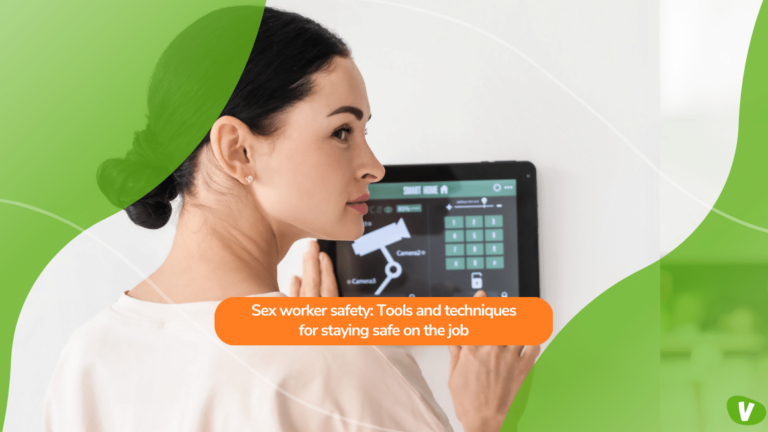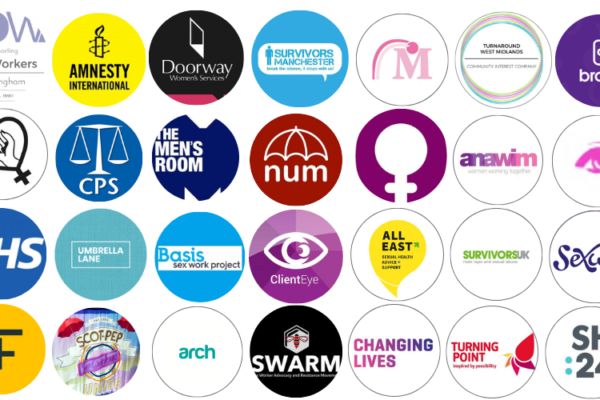Safety at work is an important discussion, especially for sex workers.
While most bookings and client interactions go without issues, it’s essential for sex workers to have a catalogue of safety tips to help them navigate these rare scenarios.
- Sex worker safety and why it’s important
- About the client screening process
- How to maintain clear communication with clients
- What is informed consent?
- Physical safety with clients and self-defence techniques
- Emotional safety with clients and strategies to navigate burnout
- Staying up-to-date on the legal landscape for sex work
- The takeaway
Whether you’re new to sex work or looking to update your sex worker safety techniques, keep reading. We’ve compiled tips and tricks to ensure sex workers stay protected while working. From emotional protection to physical tools, you’ll have a good overview of sex worker safety after reading.
Sex worker safety and why it’s important
Staying safe as a sex worker is imperative. Safety practices allow sex workers to protect their mental and physical health, ensuring their well-being is in check and they can achieve a more fulfilling work life.
Sex workers still face risks, including stigma, harassment, and physical violence. Addressing these problems head-on creates better working conditions that put sex workers’ mental and physical health first.
Challenges of staying safe as a sex worker
Today, sex workers still face challenges, no matter their niche. Below we’ve listed some common challenges to raise awareness. Learning about the problems is the first step to tackling them with actionable solutions.
- Discrimination and stigma. This can lead to social isolation, problems accessing healthcare and services, and mental health issues
- Criminalisation. In some countries, sex work is illegal which makes it more dangerous
- Harassment and violence. Sex workers are often at risk of physical and verbal violence
- Lack of legal protection. This includes no labour protections and safety protection
About the client screening process
One of the first steps sex workers can take towards safety is screening clients. The client screening process is the act of checking your client’s background before accepting their booking. This can include talking to them for some time, running their details through checking databases, and verifying their identity.
Why should you screen clients?
Screening your clients is a step towards safer working practices. After you’ve checked through a client’s background, you can make better-informed decisions about who you work with. If anything looks dodgy, you can turn down their booking and opt for more professional clients.
How to identify client red flags
Not sure what you’re looking for? Here are some red flags that may signal a bad client:
- Aggressive behaviour
- Refusal to provide relevant information
- Disrespecting boundaries
- Signs of substance abuse
- Inconsistent/misleading information
- Lack of personal hygiene
Being aware of these red flags will help you realise who is wasting your time and who might pose problems in the future.
Top strategies for client background checks
Client screening and background checks add an extra layer of protection to your working environment. However, before you start asking them for more information, try these background check tips.
The ClientEye safety app allows sex workers to report timewasters, no-shows and abusive or dangerous clients among others. By checking a potential client’s phone number, you can immediately see whether this number has previously been reported.
Similarly, you can use the NUM (National Ugly Mugs) database to check client emails and numbers. NUM is a UK charity dedicated to providing safety tools and support to sex workers. Here, you can see if your client has been reported before, get updates about incidents in your area, and get support if you face an incident.
Some sex workers like to ask potential clients for references from previous sex workers. This can establish trust between them, and it will show the client has been respectful to sex workers in the past.
You can also ask clients to provide a photo ID to verify their identity. This proves they’re not lying, and having more information about them provides you with safety and tools in the future if anything goes wrong.
If you don’t want to ask questions, you can use online searches to your advantage. For example, checking social media profiles, criminal background checks, and public records. In some cases, you can also look at online review platforms for comments from previous escorts.

How to maintain clear communication with clients
Alongside conducting background checks, sex workers need to ensure their communication is clear throughout client interactions. Clear and direct communication removes the issues of misunderstandings and leads to a more professional relationship.
Clear communication can include:
- Setting clear expectations
- Using concise and direct language
- Actively listening to clients
- Using boundaries
- Remaining professional
- Checking they understand
The importance of boundaries
Boundaries are mentioned a lot when it comes to sex work. But why are these so important?
Setting boundaries allows sex workers to protect their well-being, safety, and autonomy. It also ensures there’s mutual respect, and if a client pushes back against boundaries sex workers should drop them.
Boundaries might include what you will or won’t do, how much personal information you give clients, and what hours you work.
Boundaries are there to keep both parties safe and ensure a satisfying experience for everyone involved.
What is informed consent?
Informed consent is about open and honest communication. This is where the client is provided with transparent information about the services on offer, allowing them to make a clear decision with all the facts.
Typically, informed consent includes what type of services are on offer, the boundaries, the fees, and the duration of the services. Clients must clearly agree to the services while understanding the parameters and risks involved before proceeding.
Informed consent is an important step towards better well-being for sex workers and clients.
How to provide clients with informed consent?
Sex workers are responsible for informing clients. The best way to provide informed consent is by discussing your services beforehand with all the relevant information, risks, and safety precautions. You should check in with the client throughout this conversation to ensure they’re okay with everything.
Physical safety with clients and self-defence techniques
Physical safety is a top focus for sex workers, and taking steps to ensure you’re physically safe is paramount. Here are some of the top tips for keeping yourself physically safe.
Ways to protect yourself physically include:
- Screening clients beforehand
- Watching for red flags
- Trusting your intuition
- Providing clear expectations & boundaries
- Self-defence training
- Creating emergency plans
- Carrying safety equipment
- Staying alert while working
Emergency plans are a must for any sex worker. These are used when a client becomes aggressive or violent. Emergency plans tend to include exit routes, a trusted contact on speed dial, and how to stay safe until help arrives.
Safety equipment is also recommended in case of an emergency. Personal alarms and personal defence spray can help when you need to get out of a situation.
Self-defence training is also advised to ensure sex workers can protect themselves. The best way to top up your defence knowledge is via classes that include physical and verbal techniques for de-escalating confrontations.
Additionally, if a sex worker is taking in calls they should aim to remove any items that could be used as a weapon and any items with personal information on them.
Need more advice? The Oasis Project has lots of practical advice for sex workers in the UK.

Emotional safety with clients and strategies to navigate burnout
Alongside physical risks, sex workers are vulnerable to burnout and mental strain. Luckily, there are some tried and tested techniques to protect yourself from emotional issues:
- Seek support from professionals or other sex workers
- Take frequent breaks from work and schedule time for self-care
- Set boundaries with all clients
- Consider mindfulness or de-stressing techniques
- Take time to practise hobbies, fun activities, or exercise
- Look after your physical health (i.e. via sleep, a balanced diet, and working out)
Emotional safety is just as important as physical safety, and sex workers should always be vigilant about preventing burnout. Beyond the Gaze is a free resource written by sex workers for sex workers which can help sex workers navigate emotional safety and privacy online.
Staying up-to-date on the legal landscape for sex work
Another way sex workers can put their safety first is by monitoring the legal framework for sex work in their location. Laws and regulations are subject to change, and staying informed is a must.
The best ways to stay up-to-date include:
- Watching legal news
- Consulting with legal professionals about their rights
- Working with advocacy groups
- Exploring educational workshops and conferences
- Watching local regulations
- Educating others and boosting sex worker visibility
Tips for navigating law enforcement
Navigating law enforcement can be difficult, but there are some tips to help sex workers have better interactions with police.
Whenever talking to law enforcement, remember these tips:
- Have a plan in place — know who to call if everything goes wrong (e.g. trusted loved ones and legal support)
- Know your rights
- Remain respectful and calm
- Don’t offer any incriminating information or provide false information
- Document any interactions for your safety
The takeaway
Sex work normally goes without incident and both parties leave feeling satisfied, although a small minority of clients may not have your best interest at heart. However, with the latest sex worker safety tips and education on the topic you can protect and remove yourself from any unwanted situations. Read more about supporting your well-being as a sex worker here.





